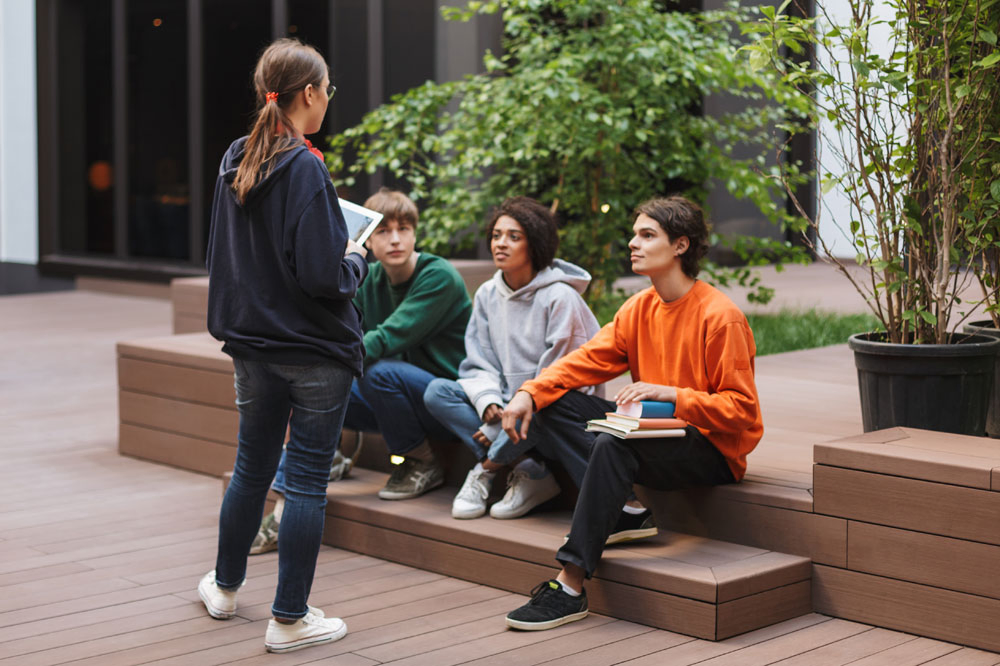
Article by:
If you make it through to the interview process of BS/MD programs, then congratulations! You’ve successfully made it past the most competitive portion of the process, so it’s definitely something to be proud of. For all programs, the number of students competing for BS/MD slots in the interview stage is considerably less than that during the general application stage, so unfortunately, the competition is likely going to get more fierce. I can speak from personal experience that students who I met during the interview process of BS/MD programs are some of the most accomplished and impressive students I have ever met! It can be inspiring and motivating to be around them, but their presence can also just as easily feel threatening and discouraging. It’s all about how you choose to interpret the situation, so try your best to keep a positive mindset and avoid negative feelings. After all, you too got an interview invite, so you are just as competitive of an applicant as them. In fact, that is perhaps single-handedly the most important point of advice to keep in mind during the interview process.
At the interview stage, everyone is on an even playing field. Your accomplishments and achievements on paper have no impact on your acceptance; your selection into this program is entirely dependent on how you interview. MedSchoolCoach allows you do a mock interview with actual physicians on admission committees.
So even if that kid next to you seems like he’s got a resume that’s twice as long as yours don’t let that psyche you out. Everything boils down to how you prepare for the interview and how you present yourself on to the faculty and students of the program.
Since this stage of the BS/MD application process is of such great importance, I’ve separated it three different parts: Before, During, & After the Interview. Each section consists of vital advice that we believe will be instrumental in your success.
Before the interview
Prepare a list of questions and practice your answers
The best and most effect strategy for success with BS/MD interviews requires planning out a list of question, preparing your answers, and then reciting those answers over and over and over again. Some of the questions you get are going to be very routine, like “Why do you want to be a doctor” or “What are your strengths and weaknesses.” And because these questions are so predictable, how you answer them is going to be telling of how prepared you are for the interview and how seriously you take this process. For other questions that perhaps catch you off guard, practicing is going to help you better construct and articulate your thoughts under pressure situations. Either way, the more you practice answers to potential interview questions, the better prepared you’ll be overall for your interviews.
Below, I’ve written a list of questions that I had answers to for all my interviews. I had put them on a Google doc and referenced them the night before each interview, so make sure to write down your answers in an easily accessible place.
- Tell me about yourself:
- Why Medicine?
- When were you a leader?
- Why BS/MD?
- Characteristics you look for in a person?
- What 3 words describe you best and why?
- What is your greatest achievement?
- What are your weakness?
- Talk about a time that you failed and what you learned from it?
- What’s the last book that you read?
- What makes a good doctor?
- What is the most pressing problem in medicine today?
- What do you like least about medicine?
- Who/what has influenced your life the most and why?
- What makes you special? Why should we choose you?
Take undergraduate alumni interviews beforehand
A lot of the general, non-medicine related questions that are asked during your BS/MD interview are likely going to be similar to those that are taken during the alumni interviews. The alumni interviews will be relatively more casual than your medical school interviews, but they will help you become more comfortable discussing topics outside of medicine. Thus, schedule your alumni interviews earlier (preferably in first semester) so that you can get as much practice beforehand as possible.
Presentation is key
As stated above, once you get to the interview stage of the BS/MD process, everything is dependent on how you present yourselves to the application committee. You could have all the experience in the world, but if you can’t talk about it and express its value to your interviewer, it’ll mean nothing.
From an interview perspective, presentation entails everything from the way you dress to the way you talk to the way you show off your accomplishments. Dress code is discussed below, but in this particular section, I wanted to focus on the other two aspects of presentation.
First off, the way you talk and carry yourself during an interview is important because it is indicative of confidence and personality. Naturally, we are all drawn to people who seem enthusiastic, friendly, and competent. Thus, if you greet your interviewer with a smile on your face and hold good posture during the entirety of your interview, you will likely leave a strong, positive impression on your interviewer. If, on the other hand, you maintain a slouchy posture and your responses are very dull in tone, your interviewer will come out feeling underwhelmed. The best way to practice your presentation is by both practicing in front of other people as well as by practicing to yourself in front of the mirror. It is important to see how other people view your interview skills and to get their feedback, but it is equally as important to critique yourself and analyze your own presentation skills. The advantage of practicing in front of a mirror is having the ability to see yourself as you speak and really notice the quirks of your presentation. Another effective way to notice such quirks is by video recording yourself and watching it back to analyze your faults. This is, in fact, exactly what professional athletes do when training for national and international competitions. Because you are, after all, your own biggest critic, and watching yourself (as opposed to having someone else tell you) helps give you better perspective of what needs improvement.
The second important aspect of presentation is how you show off your accomplishments. In your essays and your resume, you had a chance to briefly note down your different experiences, but interviews give you a chance to explain them in further depth and detail. If you have additional resources that will help you better relate your experience, then bring those with you and make sure to display them in a professional manner. For example, if you’ve done research in a lab and want to talk further in detail about the project that you worked on, then perhaps bringing a copy of your research report will be of use. Your resume may provide a generic understanding of your research, but with a copy of your full research report discusses the more technical aspects of your work. Your report should be complete with all diagrams, graphs, and written details necessary. And not only that, but you should make sure to print it out on high quality paper with colored ink and display it in a report cover. Taking extra measures like this are really going to elevate the level of your presentation. The difference is always in the details, and these details are exactly what differentiate a prepared and professional applicant from an average applicant.
Keep your dress code conservative and neutral
The best piece of advice I got in regards to my interview attire was to dress to be “as undetectable as possible.” This means don’t wear any flashy colors or outfits that could draw unnecessary attention. They could potentially be distracting, and that is of course the last thing you want. So for girls, I recommend a blazer, neutral colored dress shirt, either slacks or a below-the-knee skirt, and closed-toed flats (you could wear heels, but you’re probably going to be doing a lot of walking, so plan accordingly!). For boys, I recommend a complete suit with a blazer, dress shirt, slacks, and dress shoes. Avoid wearing tennis shoes or crazy colored socks to minimize attention drawn to them. I also would recommend ironing your clothes before an interview because wrinkly clothes can also be distracting and signs of unprofessionalism.
Some people may mistake these interviews for business casual, but it’s important to dress for business professional because it’s indicative of your seriousness. Keep in mind, though, this applies only for the interview day itself. Some programs have 2-3 day long interview weekends where only 1 day is meant for interviews and the other 1-2 days are meant to be spent with your student host. For those other days, its perfectly fine to wear normal clothes (like jeans and a t-shirt), so make sure to pack some of those too if your program has a longer interview session!
Talk to upperclassmen who’ve interviewed for the program
As mentioned several times before in other blog posts, I have always found that talking to upperclassmen about the application process to be one of the best ways to get an upper hand in the selection process. Thus, if you know any upperclassmen who’ve interviewed for BS/MD programs, talk to them! If they’ve interviewed for the same program that you’re interviewing for, then that’s even better. But even if they interviewed for a different program than you, their advice is likely still relevant and can be helpful to you. Ask them exactly what they did to prepare for the interview and what the entire process was like. Also, ask for any connections they have to other students in other programs. Often times they will, and if they do, then ask for that person’s contact information and send them an email asking for advice. In my experience, students (even those who are strangers to you) are generally quite open and willing to share their experience, so always make an effort to reach out to them!
If you follow all the steps listed above, then there’s not much else you can really do to prepare for BS/MD interviews. Try not to obsess over the results and instead focus on keeping a relaxed and focused mind for the interview. Beyond that, there’s not much to it! In the next couple of blog posts, I’ll go over exactly what you can do on the interview day itself to strengthen your chances at being accepted into the program, so keep a look out for them!
How might you deal with a terminal patient? What are pressing health issue today? There are tons of applicants equally as qualified as you, and many of them get interview prep support from professional doctors on admissions committees. You can, too!
Know your research inside-out for your BS/MD interview
In medical school interviews, you are going to be talking to highly qualified professionals who themselves have extensive training in research. So even if they haven’t done research in the exact field as your, they likely have enough experience to understand the technical details of what you did. And if they don’t, then they’ll know exactly which questions to ask, which means you need to be ready to answer any and every thing.
Hopefully you already know the details of your own research, but if not, then do the reading necessary to brush up on anything you’re unfamiliar with. I then recommend making a small presentation to your mentor and asking them to be really critical of you; encourage them to ask tough questions so that you get some practice answering them before your interview.
I personally have never had an interviewer grill me with tough research questions, but I do have friends who’ve faced that situation. In fact, one of my friends was faced with a panel of student researchers who were studying the same topic as she was, so they asked her a number of complicated and in depth questions. Though that may have just been her luck, it is always best to be prepared for the most difficult of circumstances.
So my advice is to know your research project inside out and practice as if you were about to face a panel of PhD’s!
Be ready for curve ball questions during your BS/MD interview
Your medical school interview is more likely to throw you curveball questions as opposed to your undergraduate interview, simply because the medical school is looking specifically to see how you respond to pressure situations.
Remember that if you get a curveball question, its okay to answer it incorrectly (some questions may not even have a “correct” answer). All you have to do is maintain your calm and try to answer the question in the most logical way possible.
Sometimes your interviewer will drop hints or try to steer you towards the right answer, and if that’s the case, then follow their cues. But again, you may or may not be able to end up with the right answer. Don’t panic, and you’ll be just fine!
Show knowledge of current medical news
If you can confidently say at 18-years old that you know which field of study you want to pursue as a career, hopefully you’ve done enough research to be able to back that statement up. And part of doing research is knowing current affairs related to that field. So before an interview, always be prepared to answer questions such as “What do you think is medicine’s biggest struggle right now” or “What do you think future doctors need to focus on/be aware of.”
These types of questions have more than one right answer. What the true purpose of these questions is to see how up to date you are with the news and current events in medicine. This is not an unexpected question, so you should be ready to answer it in a confident and informed manner.
There may be interviews in which this question is not asked, but in that case, you have the opportunity to seem more informed than the average applicant by mentioning a current issue in the answers to one of the other questions. And what’s better? Perhaps mention some work that the medical school you are interviewing for is doing in reaction to those current affairs. Using either of these approaches will show the interviewer that you are a well-informed student who’s done their research and has the proactive attitude necessary for doctors.
Now that you know the difference between the two interviews, hopefully the purposes of the separate interviews are a bit clearer now. Most students enter these interviews without knowing exactly what to expect or how to act, so knowing this information will help you be one of the more prepared applicants.
Schedule a Mock Interview with a Physician Advisor
There’s a lot to do to prepare for BS/MD interviews. Depending on the school, you may have either one or two rounds of interviews (except for Brown University’s PLME, which has no interview at all). If you have two separate rounds of interviews, then the first round is usually with the undergraduate school and the second round is with the medical school. If, on the other hand, you only have 1 interview, then you will likely interview with both the undergraduate school and the medical school on the same day. There’s some general advice that can apply to both interviews, but there is also specific advice on what to do during each individual interview. For now, I’ve focused just on the general advice so make sure to follow along and hopefully you will find it eye-opening!
During Your BS/MD Interview
ALWAYS ACT PROFESSIONAL
One of the biggest misconceptions about interviews is that you are only being “assessed” during your specific interview slot. In reality, though, you are constantly be judged and evaluated. This includes during the breaks you have in between interviews and during any social situations (such as dinners or after-interview parties). Basically, the moment you step foot on the university campus, you must always be prepared to put your best self forward for the entire duration of your stay. Thus, try to always maintain a relatively professional demeanor because someone is always going to be watching and taking note of how you act in different situations, and the selection committee will make use of those notes when discussing applicant qualifications.
TALK AND BE CORDIAL TO CURRENT STUDENTS IN THE PROGRAM AS WELL AS WITH OTHER APPLICANTS
One of the most important aspects of being a doctor is the ability to communicate and relate to other people, even if they are complete strangers (and in this case, your competition!). But for the means of the interview, you have to forget that you’re competing against all these students around you. Instead, try to find common ground with them and talk about other interests and hobbies. As stated above, you are constantly being judged throughout the interview day, and your ability to be social is of great importance. Try to avoid going off into one corner and doing your own thing or shutting yourself off to other people, because that will all negatively affect your chances of being selected into the program.
DO ALL THE “OPTIONAL” THINGS
Sometimes during your BS/MD interview day/weekend, there are going to be optional activities offered to you. But if they’re there and listed in your itinerary, you should never assume them to be “optional”. In reality, these optional activities are there to test your enthusiasm and interest in the school. For example, one of the universities that I interviewed at had an optional school tour because it was freezing outside and didn’t want to force anyone to walk out in unbearable cold. But think about it; if someone decides to opt out of a school tour simply because the weather is a bit harsh, what does that say about that student? You could potentially be spending the next 4-8 years there with those exact same weather conditions, so should the weather really deter you? Of course not! The weather may not be ideal, but it’s a hurdle you should choose to face if you want to really prove your interest in the university and their program. Similarly, if you are offered any other optional activities (such as Q&A sessions, educational seminars, lecture visits, or overnight stays), always partake in them. It’ll show your genuine interest in the school.
ASK THE RIGHT QUESTIONS
When you get to campus and meet with the current students of the program, it’ll be tempting to unload a number of questions about them in regards to the specifics of the interview. But speaking from my experience as a current BS/MD student, I can tell you that that is extremely unappealing. There is no problem in asking a few interview related questions that you are genuinely interested in knowing the answer to, but in general, avoid asking about topics such as acceptance rates. Instead, ask about our majors or our interests and involvements on campus. These questions help show us that you’re a real student who’s actually interested in getting to know more about the school and the people there as opposed to simply getting into the program. It’s natural to worry about acceptance rates and curve ball questions, but those are worries that you should address before you get to the interview day rather than addressing them on the interview day itself.
HAVE A “CHEAT SHEET”
Before you leave home to travel to campus for your interviews, it’s important for you to write down a little cheat sheet that you can easily carry with you and access during your stay. On this cheat sheet, you can include your main talking points, questions you want to ask, or even little words of encouragement for yourself. During the interview process, you’ll probably be overwhelmed with feelings of both excitement and nervousness, so it’ll be easy to forget to mention certain points you had in mind. If, however, you’ve got a piece of paper with all those points written down, then all you have to do is take a quick glance at it and you’ll instantly remember what thoughts and questions you had. This is especially helpful to do right before your interview slot. I recommend getting to the interview room about 10 minutes early and using that time to refresh your mind and go over your cheat sheet once more. That way, you’ll minimize the chances of forgetting important notes you wanted to mention, and with that, you’ll likely feel more comfortable and confident during the interview itself.
SMILE AND RELAX!
The interview process is extremely nerve wracking and stressful, but the best thing you can do is to put yourself at ease and forget the stakes. Remember that as a doctor, you’ll be dealing with pressure situations on a daily basis. What’s important is that you can keep your composure and react appropriately to the situation. Similarly, with these interviews, it’s important for you to keep your calm and maintain a relaxed demeanor. The outcome of the interview is out of your control, so the only thing you can do is present your best self and hope that it’s enough to get selected. Even if something goes wrong or you think an interview didn’t go as well as you had hoped for, don’t let it ruin the rest of the day/weekend. You can’t always interpret what others think of you, so instead of stressing over that, focus on the positives and enjoy the process. A relaxed composure is a sign of confidence and, if anything, it’ll help improve your chances of getting selected!
Some of these tips may have given you a new perspective while others told you nothing you didn’t already know; regardless, they’re all good reminders to keep in mind during your interview. In the next blog post, I’ll go more in depth on what specific tactics to apply during the individual undergraduate interview and medical school interview, so stay tuned!
After Your BS/MD Interview
I want to talk about something that most BS/MD students don’t usually consider until it’s too late. It’s good to start thinking about some of these things as early as when you come home from your interview travel. Who you contact and what you do after you interview is instrumental to both your selection into the program as well as to your ultimate college decision, so don’t take for granted the post-interview steps.
Email program faculty
By emailing the program faculty members (even those whom you may not have had a chance to talk to directly) and expressing your gratitude for their efforts shows that you’re really serious about this program. Once you’ve reached the interview stage of the BS/MD process, your accomplishments don’t really matter anymore. It’s your enthusiasm and excitement for the school and program that are really going to set you apart from others, and one of the best ways to express those sentiments is through an email. It should be apparent from both the length and the content of the email that you took the time to think it through and really make sure you delivered a personal message. By simply sending a “thank you for having me” email, you don’t really add any value to your application. Make sure to also send this email within 1-2 days of the interview to ensure that this act of appreciation is taken into consideration when the selection committee is deciding which applicants to select for the program. The decision is generally made within a few weeks of the interview day/weekend (because program faculty want to make final conclusions while the interview process is still fresh in their mind) so you don’t want to be too delayed in sending the email.
The point is, by taking the time to thank people who have worked tirelessly for the past few months to set up this interview process, you’ll show them that not only are you a smart and diligent student, but so too a kind and grateful person, and that’s exactly the kind of qualities these programs are seeking.
Reach out to upperclassmen
In addition to showing appreciation towards the program faculty, you also want to make sure to reach out to any current students of the program whom you may have had a chance to talk to during the interview process. Some programs take into consideration student input while others may not, but either way, the program will not tell you what they do. So to be safe, it’s always safe to extend your gratitude to any upperclassmen to make sure you’re on their good side as well.
With upperclassmen, it’s not always a requirement for you to send a lengthy and formal email as it is with program faculty. Sometimes simply showing your appreciation via a Facebook message or text is good enough. You should note, however, that a thoughtfully written out email will make a stronger impression. So I would recommend evaluating how impactful the upperclassmen whom you are planning on sending the note to was throughout your interview, and then making an appropriate decision based off of that. For example, if you stayed overnight with a student host, then I would suggest you send that person an email. If, however, the student was simply someone you had one or two brief and casual conversations with during your visit, then a Facebook message will suffice. Be thoughtful and be appreciative; beyond that, there’s not much to it!
Pursue scholarship options
Once March 31st rolls around and you know of all the programs and regular universities you were accepted to, make sure to not let up just yet! Now is the time to take advantage of all the hard work you’ve put in over the last year and try to get as much scholarship money as possible.
As a general rule, it’s not uncommon for BS/MD programs to offer you slightly less scholarship money relative to the other schools. This is simply because these BS/MD programs are offering something that is arguably more valuable than a couple thousand dollars: rare opportunity for an easier route to medical school. Thus, the best leverage to use against these programs is money that other programs are offering you. Because in that case, both sides are offering simpler routes to medical school, so the only other differentiation is money. It is possible to use a regular undergraduate school’s scholarship money as leverage, but it will likely only be effective if that university is quite prestigious. If not, still give it a shot, but don’t be too surprised if the BS/MD program doesn’t match that amount exactly.
Evaluate all options
Now that you’ve interviewed at all the BS/MD programs and have hopefully toured your top undergraduate university options, take some time to figure out which of these schools is best for you. For some people, choosing a BS/MD program might seem like the obvious simply because its providing an easier route into medical school, but don’t be too quick and jump the gun on that decision.
Some BS/MD programs are essentially a “trap.” They use the classic carrot and stick method to entice students and get them to come to their university (to improve their rankings and statistics) by dangling in front of them that conditional acceptance to medical school. At first, there’s seems to be nothing wrong with that. But once you take a closer look at some of the requirements that must be fulfilled in order to gain that acceptance (such as a high MCAT score, a high GPA, or a strict requirement of all science-related activities), you’ll come to realize that there aren’t all that many perks to actually joining such a BS/MD program. If you were to be a traditional pre-med student, you would likely do all the same things but instead at an undergraduate university that is either more prestigious, offering you more scholarship money, or is generally a better fit for your personality. So in this situation, attending that BS/MD program makes really no sense at all.
The best way to decide whether to choose a BS/MD program over a regular undergraduate university (or to decide which specific BS/MD program to choose if you have multiple offers) is by creating a list of your specific educational needs. So, for example, my list consisted of: scholarship money, people, school size, medical school prestige, undergraduate school prestige, MCAT/GPA requirements, and types of classes offered. If a BS/MD program is strongly lacking in all aspects of your list while another undergraduate university is soaring in all aspects except for the medical school guarantee, then I’d recommend choosing the undergraduate school. If one BS/MD program is more prestigious but is offering you very little money as opposed to another BS/MD program that is slightly less prestigious that is offering you a large sum of money, then perhaps consider choosing the program offering more money. In the end, it all comes down to personal preference; the point is to not make a decision solely based on one factor (generally being medical school guarantee/prestige) but rather on a multitude of different factors. Of course, you will have to compromise in some places to benefit in others, but be careful not to compromise too much in any one area just for a conditional acceptance.
At the end of the day, if you’ve been accepted into any BS/MD program, then you likely have the work ethic and intelligence necessary to become a doctor through the traditional route as well. So make a well thought out decision that will really maximize your chances at future happiness and success.






